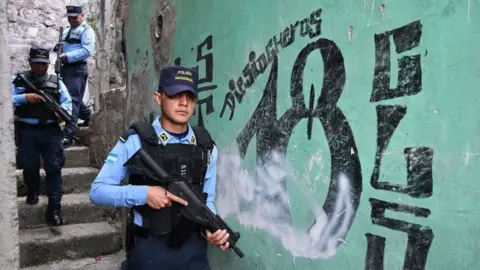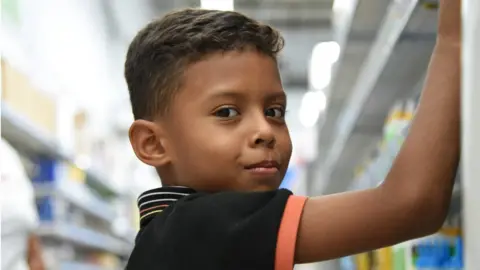Honduras gang violence at 'war-like levels' - NGO
 Getty Images
Getty ImagesPeople living in Honduras are facing "war-like levels of violence", the Norwegian Refugee Council (NRC) has warned.
During a visit to the Central American country, the organisation's head Jan Egeland spoke to "people whose suffering was on the level with what you would find in any armed conflict".
Entire communities were being forcibly displaced by gangs, he said.
He urged governments around the world not to neglect the crisis.
Mr Egeland said that the number of killings in Honduras - as well as in neighbouring Guatemala and El Salvador - was on par with that in armed conflicts, turning thousands of people into refugees.
Women in particular often become victims of sexual violence and femicides there, with an average of one woman murdered every 28 hours.
Children are not immune to gang violence either. Mr Egeland told the BBC that he visited a school in the city of La Lima, which had seen student numbers drop from 5,000 to 1,200 over the past five years.
 Ed Prior/NRC
Ed Prior/NRC"There's been a catastrophic drop out. Students either migrate north [to the US] or they are too afraid to even attend school, they stay home out of fear of being recruited by armed gangs."
He said he had met one family whose 13-year-old son had been approached by a gang.
When the father forbade the boy to join, the family was given 24 hours to leave their home.
"They went into hiding with the NRC," Mr Egeland, whose organisation provides shelters for those fleeing violence as well as funding for schools, said.
Many pupils, he explained, could not afford to attend classes because their families relied on them to go out to earn money for food.
While Honduras has long been suffering from wide-spread gang violence, many people there have also contended with the aftermath of two almost back-to-back hurricanes that hit in November 2020.
According to the NRC, 3.2m people are in need of aid in Honduras alone, with many requiring both protection and food assistance.
Mr Egeland praised the Honduran government for introducing a law supporting internally displaced people, but he warned that this legislation needed "financial and diplomatic support from the outside world" to be implemented effectively.
